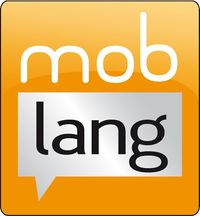|
The MobLang Project was funded under the European Commission’s EACEA Transversal Programme KA2 - Languages. The project was coordinated by the Cyprus Neuroscience & Technology Institute and was carried out in collaboration with partners from Northern Ireland, UK, Basque country, and Greece.
Background
Language barriers between individuals of different ethnic groups living in the same country, or Europeans visiting other countries for business or pleasure, hinder natural interaction. Communication in a foreign language can hold back the development of friendships and closer relationships, thus preventing fruitful intercultural exchange and dialogue. Basic language knowledge of one’s conversational partner is usually appreciated and creates a comforting atmosphere. Today’s Europeans are too busy to attend a language class. Exploiting technology and especially the recently emerging developments in mobile learning could offer a viable alternative. Mobile phones are optimal learning tools that could enable people to learn any time, anywhere, and at their one own pace, even during leisure time. The proposed project applies Mobile Assisted Language Learning (MALL) to support minority and/or less-frequently used and less-taught European languages (LWULT)
Overall Objective
The aim is to promote intercultural dialogue especially in former European conflict regions or regions with many minority groups through promotion of linguistic diversity. The focus is in Cyprus (Turkish), the Basque country (Basque), Northern Ireland (Gaelic), and within as well as around Greece (Albanian, Turkish). The project will develop the open-source mobile learning environment 'MobLang' in which users can design and publish their own prototype micro language courses. User specific micro courses will be embedded in a social and cultural context, which will include activities such as lectures, exercises, games, quizzes, as well as access to a live tutor. Throughout the life of the project and beyond, MobLang will be designed, developed, published, and disseminated to children/pupils, teachers, parents, students, business people, travelers, and individuals who want to build strong and long-lasting friendships and relationships with individuals from an ethnic minority group.
Products of the Moblang project
Portal
Language Cafés
More than 10 Language Cafés have been organized by the various partners in order to disseminate the project and support potential users use the system.
Press Conferences
- 14, Oct, 2011, San Sebastian: MobLang 2011 Press Conference in San Sebastian
Academic Conferences
MobLang has been presented in a number of academic conferences.
SALL 2010[1]
ICT4LL 2010[2]
FliT 2010[3]
FliT 2010[4]
Curricula for learning languages through mobile phones
Curricula have been developed in all language combinations for learning languages through mobile phones, which have been released as open source to the public domain.
Free Software available on SD cards for Java mobile phones
Open source released to public domain
MobLang media coverage
MobLang coverage in TVs
- MobLang on eitb.com/Basque TV 19, Oct 2011, San Sebastian[5]
- MobLang on diariovasco.com TV 15, Oct 2011, San Sebastian[6]
- MobLang on eitb.com/es TV 14, Oct 2011, San Sebastian[7]
- MobLang on Biz/Emeis/CyBC TV 18, May 2011, Nicosia[8]
MobLang coverage in radios
- MobLang on Simviosi kai Diapolitismikotita/Radio RIK1 7, May 2011, Nicosia[9]
MobLang coverage in newspapers
- MobLang in Berria.info newspaper 15, Oct 2011, San Sebastian[10]
- MobLang in Finanzas.com newspaper 14, Oct 2011, San Sebastian[11]
- MobLang in Noticiasynoticias.com newspaper 14, Oct 2011, San Sebastian[12]
- MobLang in Europapress.es newspaper 14, Oct 2011, San Sebastian[13]
- MobLang in Abc.es newspaper 14, Oct 2011, San Sebastian[14]
- MobLang in Cyprus Airways Magazine 6, Feb 2011, Cyprus[15]
- MobLang in Cyprus Weekly 17, Sep 2010, Nicosia[16]
- MobLang in Alithia 16, Sep 2010, Greece[17]
- MobLang in Express 13, Sep 2010, Greece[18]
- MobLang in To Vima 10, Sep 2010, Greece[19]
References
- ↑ Taraszow, T., Aristodemou, E., Slavidou, V., Burston, J, and Laouris, Y. (2010). MobLang—Learning Foreign Languages via Mobile: A Cross-Country Comparison of End Users’ Profiles, Motivation, and Preferences. Social Applications for Lifelong Learning, Patra, Greece, 4-5 November 2010 Available online
- ↑ Taraszow, T., Laouris, Y., and Briggs, A. (2010). MobLang—Learning Foreign Languages via Mobile: Technical Requirements. ICT for Language Learning, Florence, Italy, 11-12 November 2010 Available online
- ↑ Taraszow, T., Laouris, Y., and Papadopoulou-Paraskevaides, Y. (2010). MobLang—Learning Foreign Languages via Mobile: Pedagogy and Curricula. Foreign Language Instructional Technology Conference - Theory & Practice, Nicosia, Cyprus, 3-5 December 2010
- ↑ Burston, J. (2010). Mobile Language Learning: Getting IT to work. Foreign Language Instructional Technology Conference - Theory & Practice, Nicosia, Cyprus, 3-5 December 2010
- ↑ MobLang on eitb.com/Basque TV 19, Oct 2011, San Sebastian
- ↑ MobLang on diariovasco.com TV 15, Oct 2011, San Sebastian
- ↑ MobLang on eitb.com/es TV 14, Oct 2011, San Sebastian
- ↑ MobLang on Biz/Emeis/CyBC TV 18, May 2011, Nicosia
- ↑ MobLang on Simviosi kai Diapolitismikotita/Radio RIK1 7, May 2011, Nicosia
- ↑ MobLang in Berria.info newspaper 15, Oct 2011, San Sebastian
- ↑ MobLang in Finanzas.com newspaper 14, Oct 2011, San Sebastian
- ↑ * MobLang in Noticiasynoticias.com newspaper 14, Oct 2011, San Sebastian
- ↑ MobLang in Europapress.es newspaper 14, Oct 2011, San Sebastian
- ↑ MobLang in Abc.es newspaper 14, Oct 2011, San Sebastian
- ↑ MobLang in Cyprus Airways Magazine 6, Feb 2011, Cyprus
- ↑ MobLang in Cyprus Weekly 17, Sep 2010, Nicosia
- ↑ MobLang in Alithia 16, Sep 2010, Greece
- ↑ MobLang in Express 13, Sep 2010, Greece
- ↑ MobLang in To Vima 10, Sep 2010, Greece
